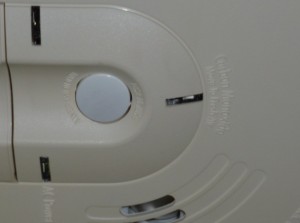 Carbon monoxide (CO) poisoning is known as the “silent killer,” but that loud, high pitched beeping that blares from your detector is meant to save your life – so never assume it’s just sounding off due to malfunction.
Carbon monoxide (CO) poisoning is known as the “silent killer,” but that loud, high pitched beeping that blares from your detector is meant to save your life – so never assume it’s just sounding off due to malfunction.
A recent study released by The New Jersey Poison Information & Education System (NJPIES) reports CO detectors don’t malfunction as often as people think. The Ocean County Health Department (OCHD) and NJPIES advise when the detector in your home sounds you need to take it seriously and get out of your house immediately and call for help.
Ocean County Freeholder Gerry P. Little, liaison to the Ocean County Board of Health explains, “It’s called the silent killer because carbon monoxide is a gas that gives no warning – you can’t see it, taste it or smell it. Never gamble with your family’s health and safety by assuming it just may be the batteries or some other unknown reason that triggered the device.”
Accidental carbon monoxide poisoning from heating and cooking appliances, tools, vehicles and other household devices and equipment kills more than 400 people every year in the United States, according to the Centers for Disease Control (CDC). It’s critical that every home have a CO detector on every level and near every sleeping area. Batteries should be checked when changing the clocks twice a year for daylight savings. And don’t remove the batteries from detectors to use somewhere else. If you suspect your detectors are malfunctioning or old, replace them immediately.
“During cold and influenza season, symptoms of carbon monoxide poisoning can easily be confused with symptoms of viral illness like the common cold or flu. If symptoms come on shortly after turning on a device in a certain room and go away after leaving the area or more than one person gets sick at the same time, then these are clues to help identify CO poisoning,” says Daniel Regenye, OCHD Public Health Coordinator.
However, people should not rely on CO sensors alone. Preventative measures are critical to avoid poisoning. The following is a list of more safety tips to help reduce your risk of carbon monoxide poisoning.
1. Clear snow from all heating and dryer vents.
2. Open flues when fireplaces are in use. Have chimneys inspected periodically to prevent blockage.
3. Never use the stove to heat your home/apartment.
4. Only use generators outside. Keep them more than 20 feet from both you and your neighbor’s home, doors, or windows.
5. Do not bring generators, pressure washers, grills, camp stoves, or other gasoline, propane, natural gas or charcoal-burning devices inside your home, basement, garage, carport, camper, boat cabin, or tent – or even outside near an open window or door.
6. Do not idle a car in a closed garage. Once you pull in, immediately turn off the engine. Be extra careful with “remote start” engines which may be on without your knowledge.
Regenye added, “If someone is unresponsive or unconscious and you suspect them being exposed to CO poisoning, get them out of the house and call 9-1-1 without delay. Trying to open windows is only a waste of time and will only cause you to breathe in more of the dangerous fumes. However, it’s ok to leave the door open after you exit so fresh air can seep in.”
